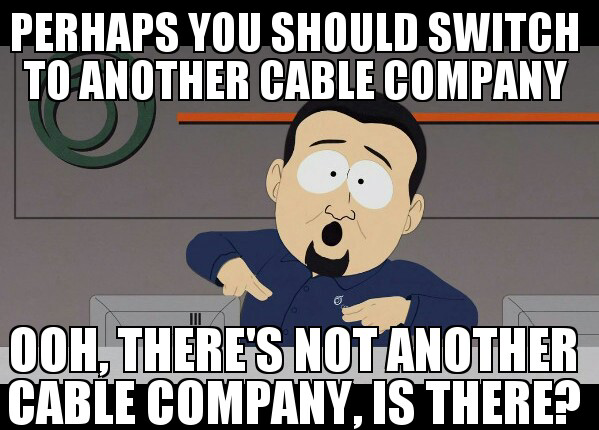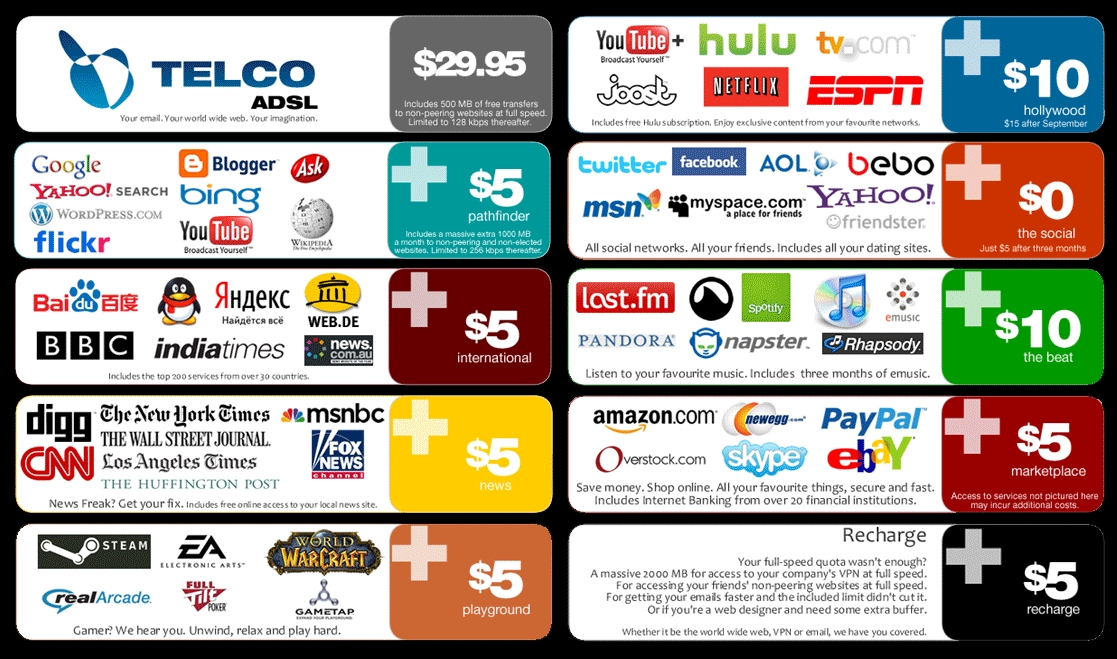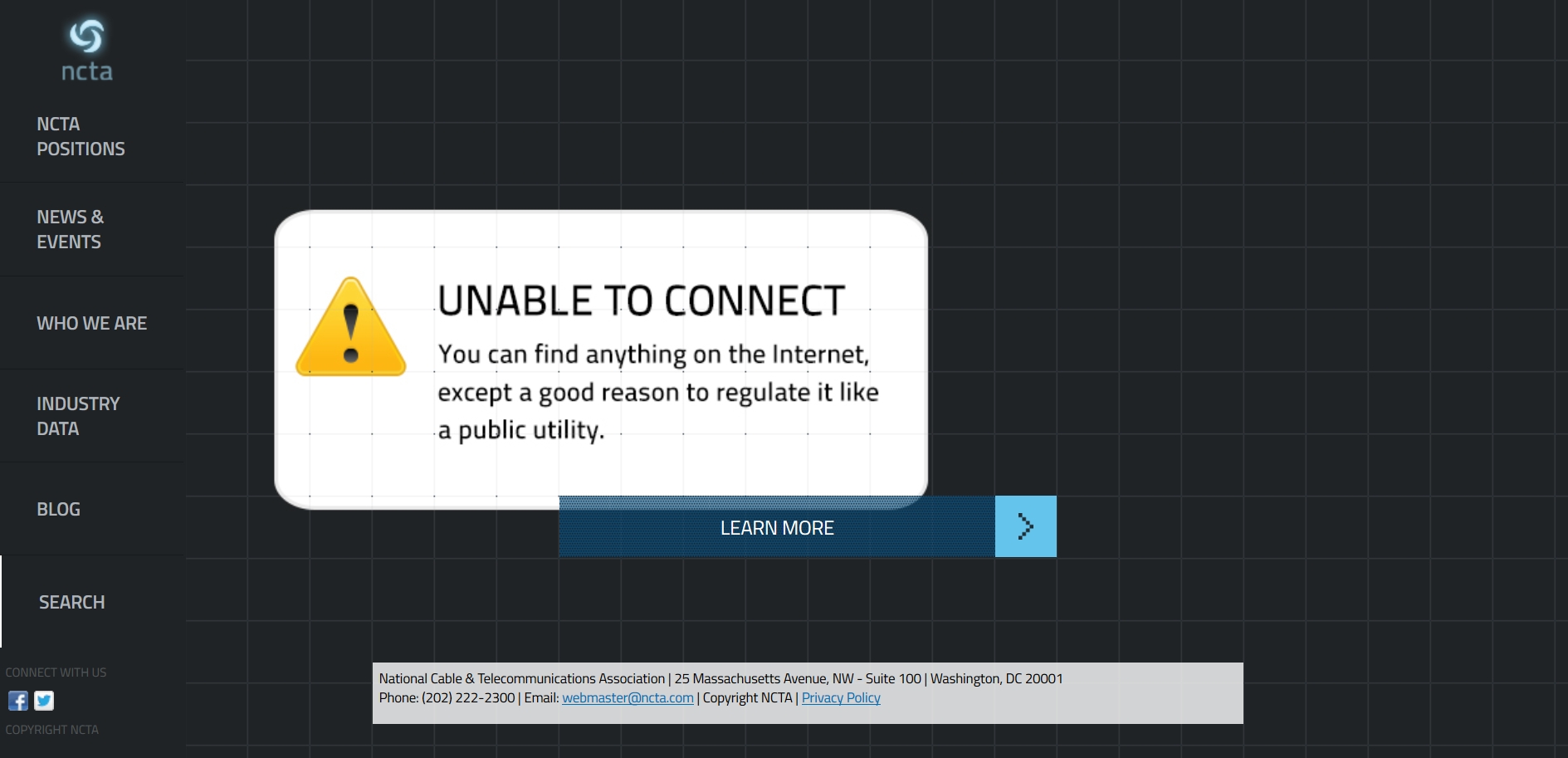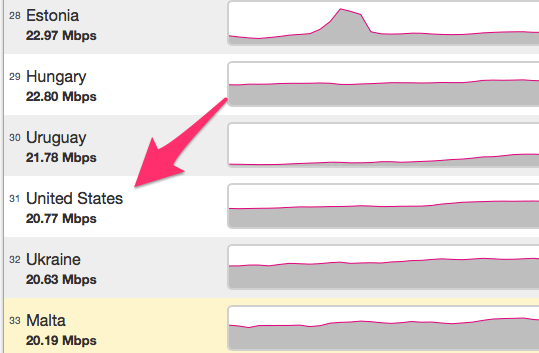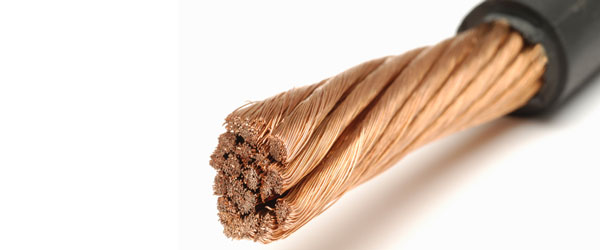Tag Archives: Comcast
So Netflix seems to be doing OK

I don’t know how many of you remember this, but a few years ago there was a big debacle when Netflix wanted to separate out its streaming and disc delivery services, and to be fair the Qwikster name by which it would do so was a bad choice. It barely worked for SpongeBob, it would never work for Netflix.
You see, what happened was, Netflix allowed for people to have an account that included both delivering DVDs and streaming, however they wanted to split those services into two separate things. That’s completely understandable, however clumsy name aside, it would also require re-registering two accounts with them and include a price hike as well.
Very Important: Today is the great internet slowdown
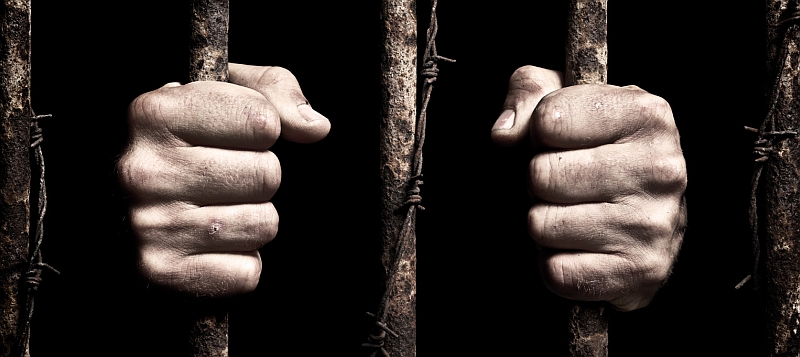
(Before I get to the post proper, I implore you to at the very least watch the video at the end of this post.)
Did you wonder what that hovering-loading-pop-up-thing was on top of the site today? Did you fill it out? Submit it? You should have. If not, visit the site in a new browser (it only appears once per visit so you’ll have to use a new browser), fill out your info, and send it in.
That thing popped up because today is the National Internet Slowdown Day. Many sites are participating including Reddit, Vimeo, Twitter, WordPress.com, Netflix, Wikia, Digg, Imgur, Dropbox, Mozilla.com, Foursquare, Meetup, and Etsy to name only a few.
But why?
As you may or may not know, the Internet as we know it is under attack. Never mind the almost religious fervor with which the international community has attempted to wrest control of the Internet (inasmuch as it can be called ‘control’) from the U.S. based, but not U.S. controlled, ICANN organization. Or the fact that Russia has mandated that all bloggers with over 3,500 unique monthly visitors register with the state, or their offering of rewards for people who can crack the secretive TOR network and identify its users. Never mind our own attempts at regulation such as PIPA or SOPA, or the constant hacking attacks that happen all the time.
No, we’re talking about the equal treatment of data on the Internet, more properly known as Net Neutrality. Essentially it means all Internet traffic is treated the same, no data is prioritized over other data. Your email to your parents gets the same priority as someone buying from Amazon or watching Netflix or accessing Canvas. But cable companies don’t want that.
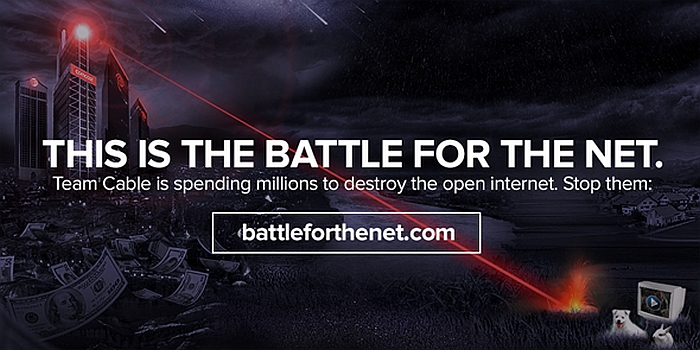 You see, cable companies want to charge big content providers to deliver their content more quickly and reliably than other content. For example, Comcast wants to charge Netflix and everyone else to give them higher-priority lines to their customers. They would also de-prioritize traffic from companies that couldn’t or wouldn’t pay. This would have sever negative effects; Netflix would have to pass the cost of that prioritized traffic on to you, the customer, and it would stifle small companies that may be innovative and offer innovative products and innovative services, but because they can’t pay for the bandwidth they need they would effectively be shut out of any type of success.
You see, cable companies want to charge big content providers to deliver their content more quickly and reliably than other content. For example, Comcast wants to charge Netflix and everyone else to give them higher-priority lines to their customers. They would also de-prioritize traffic from companies that couldn’t or wouldn’t pay. This would have sever negative effects; Netflix would have to pass the cost of that prioritized traffic on to you, the customer, and it would stifle small companies that may be innovative and offer innovative products and innovative services, but because they can’t pay for the bandwidth they need they would effectively be shut out of any type of success.
Not only that, your quality of service will go down, your Internet speeds will go down, and your costs not just for Internet service but the services that use it (like Netflix) will go up.
Not only that, say Comcast invested in a streaming service like, oh, say Hulu. They could prioritize Hulu traffic and stifle Netflix traffic. They have been directed not to do that, but they are so blatant about their anti-competitive practices it wouldn’t surprise me in the least to see them do it anyway.
Or they could simply charge you extra if you wanted to visit certain sites like Amazon or Netflix or CNN or whoever. Perhaps they could bundle pricing like they do with cable channels: If you want good access to news sites like CNN and Fox News and NBC then you pay a fee for that group of sites, and if you want access to retail sites like Zappos or Macy’s or Barnes and Noble you’d pay for that too. Or if you’re a gamer, there’d be a bundle there as well. Something like this, perhaps:
Of course cable companies, ISPs, and hardware providers are doing all they can to make the Internet, your Internet, one big command-and-control that they lord over like dictators, and if something isn’t done the entire Internet and on-line experience will change, and not for the better.
Reclassifying them as common-carriers, which is being considered as what’s known as a ‘nuclear option,’ would mean they were considered a utility like power and water and therefore could be heavily regulated. Needles to say, they absolutely and steadfastly do not want that, because it would force them to be fair, ending idiotic statements like this.
There are opposing views, by the way, and some are able to make well-written, compelling arguments against the common-carrier idea. Of course, that link is actually to the National Cable and Telecommunications association website, so their position should be of absolutely no surprise. After all, below is what pops up if you visit their homepage – are you surprised?
And the whole thing can be eerily convoluted.
Net neutrality is something people should be enraged about. They should be rioting in the streets, it will impact every single one of us and further cement the monopolies that the cable industry already enjoys. People’s passivity about the whole thing is baffling.
FCC chairman Tom Wheeler, who used to be a cable-industry lobbyist, didn’t seem to care in the past for pretty obvious reasons – he was still well-aligned with his previous industry.
But then something happened. Something very important. Something we didn’t expect, and didn’t see coming, but that we desperately needed. After witnessing it, suddenly the whole thing shifted tide.
John Oliver.
It turns out that you, yes YOU dear reader, can actually go to the FCC’s website and leave your thoughts about Net Neutrality, but many people don’t know that (I only linked to the main page so you can see all the issues open for comment. You want 14-28, but look at what’s number 1!). But once John Oliver laid out the importance of this fight in very clear language, the FCC’s servers crashed under the weight of the response. And that’s what we need! It’s what you need. It even miraculously appears to have swayed Tom Wheeler himself!
I posted this video last semester, and I am doing it again here because it is so important. If you do nothing else, please watch this video, and leave a comment with the FCC before September 15th. You’d better do it now, because very soon it will be too late.
You’d better watch this video right now.
This post will dovetail with the one below, so you might want to read them together.
Are you familiar with Net Neutrality? If not, you should be. It’s one of the single most important technical challenges we are facing as a country, and as a global community. The Internet is under regulatory attack on two separate fronts, and no one seems to care. As crazy as we go over soccer or the Kardashians or legalizing pot, the future of the Internet just doesn’t get a lot of public attention.
But it should. Because we may be on the brink of losing the Internet as we know it.
The first issue is the handover of ICANN, the organization that controls the creation and control of web addresses, from the control of the United States. Honestly, it’s not really under the control of the United States, as other governments have a say in issues that come up, but it’s headquartered in California and it’s generally considered that we’re the final authority. It wouldn’t normally bother me that a global entity such as ICANN ends up under global control, except the countries that really fought to have it released include Russia, China, and North Korea, some of the most oppressive countries on earth when it comes to the flow of information and the right of people to voice opinions. They couched it in terms of concern over security in light of the Snowden leaks, as have other countries, however I’m of the firm belief they so desperately want this to happen so they can more heavily regulate what appears online, especially dissent.
But the much, much more immediate threat is the end of Net Neutrality. Net Neutrality essentially means all Internet traffic is treated equally, and no one’s data is more important than anyone else’s.
 However, with appointment of former cable-company lobbyist Tom Wheeler as head of the FCC, the bizarre decision by the Supreme Court to end legal requirements to maintain Net Neutrality, and the impending merger of two of the largest cable providers in the country, Net Neutrality has a fight of Biblical proportions in front of it.
However, with appointment of former cable-company lobbyist Tom Wheeler as head of the FCC, the bizarre decision by the Supreme Court to end legal requirements to maintain Net Neutrality, and the impending merger of two of the largest cable providers in the country, Net Neutrality has a fight of Biblical proportions in front of it.
If it ends, that means some services will be forced to pay for better service for their customers. For example Netflix would pay Comcast to not slow down their service, but that would mean a higher cost that Netflix would have to pass on to you. Or, if a cable company has an investment in one service, they could stifle the speed of a competitor that you are using making it unusable. We have already seen the issue crop up. The Internet will never be the same; you will be charged more for inferior services, and be at the mercy of the providers.
However, after typing all this, rather than typing another 1000 words I am just going to let John Oliver explain it. He does an outstanding job. shows charts and graphs that really illustrate the problem, and you’ll have a good chuckle along the way. Don’t miss it, it’s a very, very important issue that can end up impacting all of us.
Data speed record broken with existing copper wire
One of the big problems we are having these days is that our Internet speeds simply aren’t fast enough. If the extent of your Internet usage is reading webpages and checking email then it likely is, but anything beyond that and you’ve probably said to yourself ‘this connection is slow.’ Slow connections can manifest in many ways including blurry video, slow file downloads, long page-load times, and others. Not only that, even if you have a fast connection, many, many other aspects can affect your speeds. Speed of the transmitter, conditions on the network, type of conduit, and so on.
Cable companies offer tiered packages, but do you really get faster speeds? You might, but as any cable company will have written in their agreement with you, those advertised speeds are not guaranteed.
Coupled with the fact that the U.S. lags woefully behind many other countries for high-speed Internet access and the much-vilified potential merger of not just the two largest cable companies in the country but the two most hated as well – Time-Warner and Comcast – the future doesn’t look good. (Below graphic from gottabemobile.com)
But there are some bright spots. Google has been laying down superfast fiber in some cities, and some regional ISPs are doing the same even while those cities try desperately, and I mean desperately, to stop it. Even CenturyLink offers high-speed fiber in some areas of North Las Vegas. Traditional cable companies are scared.
The big problem with fiber is it requires a whole rebuilding of the network infrastructure, ripping up roads, yards, and utilities, putting new hardware in place: The cost for Google alone could rise into the billions, with the cost of a country-wide revamp costing much, much more. And even with fiber, the wire that actually goes into your house, known as the last mile, is still copper although similar advancements have been made there as well.
But there may be hope for us all yet, and perhaps a hidden respite for the beleaguered cable companies. Researchers at Bell Labs managed to create record-breaking speeds of 10 Gigabits per second across plain old copper wire (press release from Alcatel-Lucent at this link). That’s crushingly fast, especially since most of us deal with speed in the Megabits per second, and even fiber provides around 1 Gigabit per second. In other words, it’s one thousand times faster than what most of us deal with right now.
If a technology like this could be deployed, it could be a huge boon. Existing infrastructure could be used, costs could be kept down, availability of fast broadband could be accessible to almost everyone, streets wouldn’t need to be ripped up, and the U.S. could hopefully not be in the embarrassing position of having such poor broadband access. On the other hand, this was a lab experiment, and the L:R ratio (lab-to-reality ratio, a term I just made up) can be years for this kind of thing. Still, it’s a promising development.

